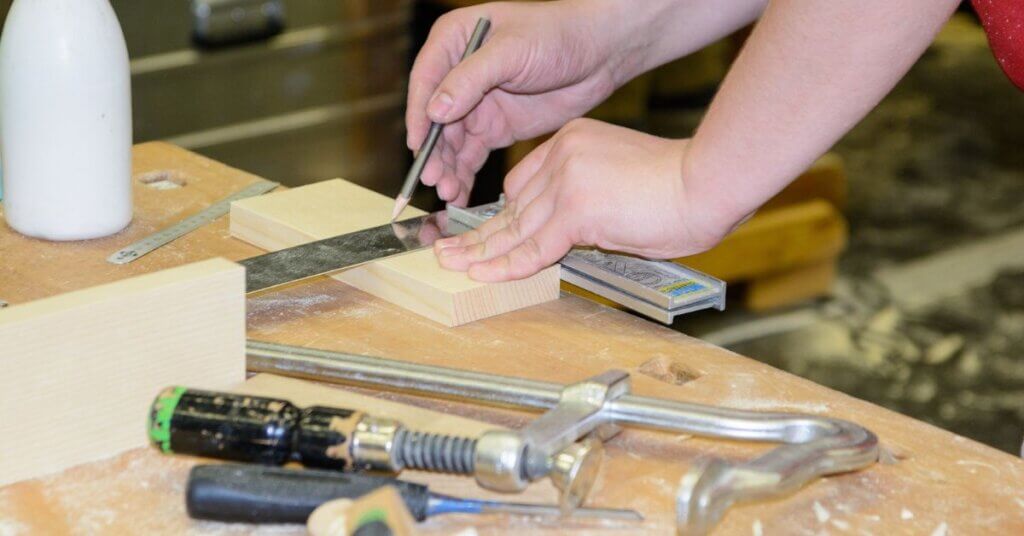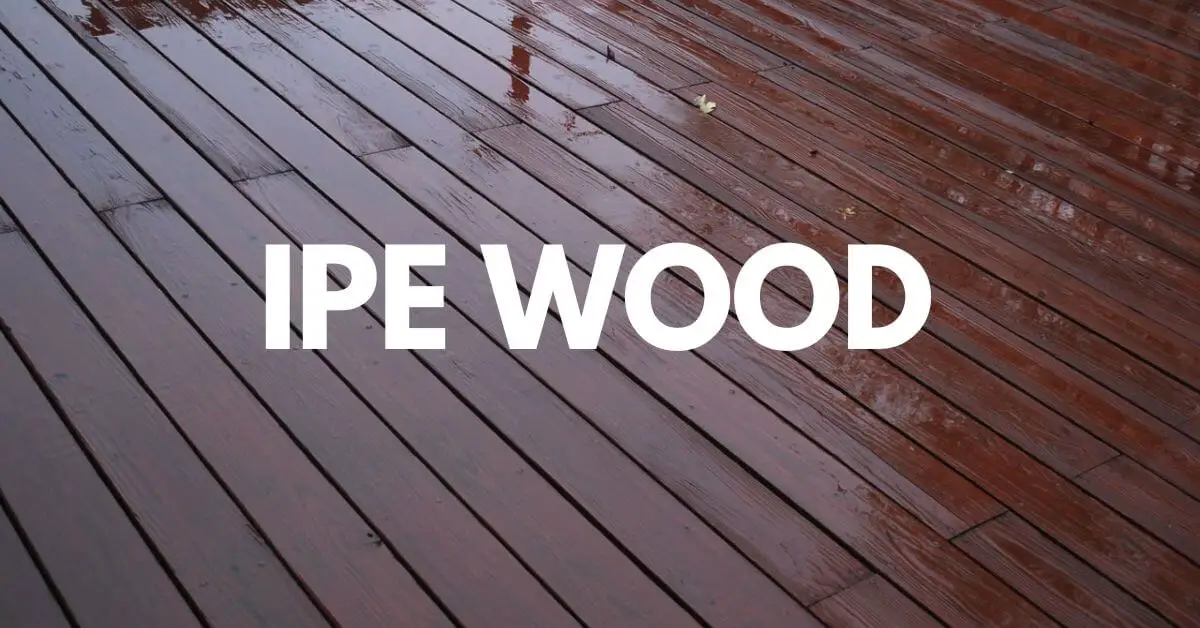What is Ipe Wood?
Ipe wood is an extremely hard, durable, and rot-resistant hardwood that is native to Central and South America. It is known for its rich appearance, durability, and strength.
Ipe wood is incredibly versatile and widely used for making decks and fences. It is the best decking material on the market today that is readily available.
Ipe wood comes from large deciduous, flowering trees that mainly grow in full sunlight. The tree grows to 100-130 ft (30-40 m) and has rough, scaly bark.
| # | Ipe Wood |
| Scientific name: | Handroanthus spp. (formerly placed in the Tabebuia genus) |
| Dried Weight: | 69 lbs/ft3 (1,100 kg/m3) |
| Modulus of Rupture: | 25,660 lbf/in2 (177.0 MPa) |
| Elastic Modulus: | 3,200,000 lbf/in2 (22.07 GPa) |
| Crushing Strength: | 13,600 lbf/in2 (93.8 MPa) |
| Odor | Mild scent |
| Wood Type | Hardwood |
Ipe wood uses
Ipe wood is often used in construction, furniture making, decks, patios, fences, and flooring tool handles. It can be used in all places where durability and strength are required.
Ipe wood can be used for outdoor purposes such as siding, and outdoor furniture. Because it is more resistant to insects and rot than other hardwoods.
Ipe wood is most commonly used to make durable decking and flooring. Because ipe wood has a high density and natural rot-resistant properties. Ipe is one of the finest wood species for decking.
Ipe wood is highly shock-resistant, so it is also used for tool handles.
What color is ipe wood?
Heartwood can vary in color from rich brown to yellowish olive brown or amber hues and its sapwood is yellowish-white and easily distinguished. Wood has dark brown or black stripes patterns which create a great visual appeal.
Ipe wood has a medium texture and grain may be irregular and interlocked, with medium to large pores.
Advantages and Disadvantages of Ipe Wood
Ipe wood is a wonderful wood species but we know that each wood species has limitations in terms of uses and properties. Ipe wood also has many advantages and disadvantages that you should be aware of before using it.
Advantages
1. Rot and insect-resistant
Ipe wood is naturally rot and insect-resistant and it does not require any other treatment.
When we are looking for wood for outdoor furniture, decks, fences, and any other outdoor structure, the first requirement is that the wood should be rot and insect-resistant. So ipe is one of the best choices for all those purposes.
2. Durable and stable
Ipe wood is known for its durability and stability, whereas other hardwoods last only for 1 or 2 decades, while Ipe wood survives for centuries.
3. Appearance
Ipe wood is beautiful in appearance, its reddish-brown or darker blackish-brown color makes it different from other hardwoods. By the way, many color options are available in Ipe wood. After finishing it gives excellent results.
Disadvantages
1. Ipe wood is too hard to work with
Ipe wood is extremely hard and dense, which creates a blunting effect on the cutting edges during sawing. So working with it can be challenging. Its grains are also interlocked and irregular which is made difficult to finish.
Ipe wood is heavy, which requires expertise and specialized equipment.
2. Expensive
Ipe wood is more expensive than many hardwoods because Ipe wood is one of the rare and most demanding woods for making decks. A grade ipe wood can cost $3.20 and 4.50 per linear foot.
3. Warping
Ipe wood contains a lot of moisture which is likely to wrap the wood after drying.
Work with Ipe wood

Working with Ipe wood is not easy. The wood is strong and dense but also has a smooth, grainy texture. It’s beautiful to look at, but also very durable and resistant to decay.
Ipe is a hardwood that’s native to South America. It’s typically used for furniture, flooring, and other wood products. It’s a popular choice because of its unique look and feel.
When working with Ipe, it’s important to take care to avoid any damage. The wood is very strong, but if it’s not treated correctly it can easily fracture. To avoid any damage, we use a special saw and
FAQ about ipe wood
Is Ipe wood durable?
Ipe wood is incredibly durable and stable. It can last up to 75 years and with regular maintenance can be even longer.
How hard is Ipe wood?
Ipe wood is extremely hard as nails, it is 2 times harder than Sapele and Honey Locust. Ipe has a Janka Hardness of 3,510 lbf (15,620 N).
The Janka scale determines the relative hardness of a particular domestic or exotic wood species.
Here are the Janka hardness ratings of other popular wood types compared to Ipe wood to get an idea about how hard Ipe Wood is.
| Wood species | Janka Hardness |
| Desert Ironwood | 3,260 lbf (14,500 N) |
| Brazilian Teak | 3,330 lbf (14,800 N) |
| Kingwood | 3,340 lbf (14,900 N) |
| Ipe wood | 3,510 lbf (15,620 N) |
| Patagonian Rosewood (Curupay) | 3,630 lbf (16,150 N) |
| African Blackwood | 3,670 lbf (16,320 N) |
| Snakewood | 3,800 lbf (16,900 N) |
| Quebracho | 4,570 lbf (20,340 N) |
Is Ipe wood rot-resistant?
Ipe wood is excellent insect and rot resistant, It is also fire and mold-resistant. Ipe has chemical compounds that they evolved to protect themselves against decay.
This type of species contains oils and acids that protect the wood from rotting. The surface of the wood has an oily appearance that can be felt.
Is ipe wood sustainable?
Ipe wood is sustainable, It is not listed in the CITES Appendices or on the IUCN Red List of Threatened Species. Ipe trees are harvested in a way that ensures healthy, sustainable, and sustainable growth.
It is one of the most environmentally friendly woods available. Ipe is harvested from managed forests.
Is Ipe wood good for decking?
If you’re looking for a durable and long-lasting wood for your deck, Ipe wood is a great option. Ipe hardwood is naturally resistant to rot and decay, making it a low-maintenance material for your deck.
Ipe wood is also one of the denser woods available, so it is very strong and less prone to scratches and dents. It can withstand moisture and weather. Wood has a beautiful natural grain that adds a touch of elegance to your deck.
What is the best finish for ipe decking?
Penofin Oil Finish works well on ipe wood because it is designed for dense hardwoods. It penetrates well into dense Ipe whereas water-based cannot. Ipe Oil and WiseCoat are other good choice for ipe wood.
Ipe needs to be coated regularly, all these oils do not last very long. That is why most people are concerned about finishing the Ipe or other dense hardwoods because their characteristics are slightly different from other hardwoods.
Does Ipe Wood decking need to be sealed?
Usually not, but you really should. Due to continuous exposure to UV rays and moisture, the grains of wood can be damaged and the wood can also become discolored.
Wood Sealer creates a protective layer on the wood which protects the wood from UV and helps minimize surface checking on your deck.
Ipe wood is excellent water and weather resistant but not completely waterproof. It can withstand more moisture than other hardwoods for several decades or even centuries.
Conclusion
Ipe wood is an excellent choice for anyone looking for a beautiful, durable, and environmentally friendly wood. You may have to pay a higher price for the properties of Ipe wood but it justifies its price.
However, regular maintenance is required to keep the ipe continuously durable.

